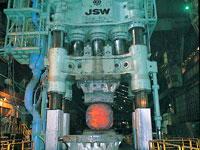Japan Steel Works (JSW) reported records sales and profit in the year to 31 March, which it attributed in part to the steady growth of its nuclear department. The company produces large forgings for reactor pressure vessels, steam generators and turbine shafts.
 |
| A 14,000-tonne press at JSW's Muroran plant (Image: JSW) |
The company said that orders received during the year by its electric and nuclear power division were substantially higher than had been forecast, at ¥59.9 billion ($628 million), a 40.3% increase from the previous year. JSW said that this was a result of the accelerated placing of anticipated orders, as well as unexpected orders.
Anticipating that the rise in nuclear business will continue, JSW expects that the division's sales will increase 24.7% to ¥45.5 billion ($477 million) in the year to 31 March 2010. The company said that it has received multiple 'pre-orders' for the manufacture of large-sized nuclear component castings and forgings, each of which came with a certain financial deposit.
JSW said that with sales of products related to oil refining expected to continue to decline due to global financial concerns it would strive to obtain further orders for nuclear-related products.
The company currently claims around 80% of the world market for large forged components for nuclear plants, notably the largest reactor pressure vessel sections, steam generators and turbine shafts.
At JSW's Muroran plant on Hokkaido it has 3000- to 14,000-tonne hydraulic forging presses, the latter able to take 600 tonne steel ingots, and a 12,000 tonne pipe-forming press. At present, its capacity is only four reactor pressure vessels and associated components per year.
In December, JSW announced that it will triple its capacity for manufacturing heavy forged components for nuclear power plants by mid-2012. Having recently embarked upon a doubling of capacity by mid-2011, the new announcement followed an agreement with Areva to supply large forged parts until at least 2016.
JSW has been manufacturing forgings for nuclear plant components to nuclear standards since 1974, and around 130 JSW reactor pressure vessels are in service around the world. The company has said that one of its main targets is to supply nuclear reactor pressure vessels to the Chinese and American markets, and it has advance orders from GE-Hitachi for ABWR and ESBWR components, as well as Areva EPR pressure vessels. New orders are coming from China and the USA, as well as Europe, and more from Japan are expected.
JSW may be the recognised leader in heavy nuclear forgings, but similar capacities are being rapidly developed all over the world. As well as JSW, the very heavy forging capacity in operation around the world today is in China (China First Heavy Industries and China Erzhong) and Russia (OMZ Izhora). New capacity is being built by JSW, Shanghai Electric Group (SEC) and subsidiaries in China, and in South Korea (Doosan), France (Le Creusot) and Russia (OMZ Izhora and ZiO-Podolsk).
New capacity is also under consideration in the UK (Sheffield Forgemesters) and India (Larsen & Toubro, Bharat Heavy Electricals, Bharat Forge Ltd). In China, Harbin Boiler and SEC are bidding for AP1000 work, and SEC subsidiary SENPE is bidding for AP1000 and EPRs, which will require very heavy forging, so they can be expected to install that capacity rapidly if required.






_15863.jpg)







